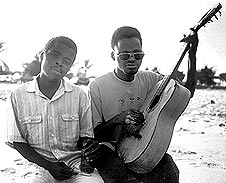
Rostov-Luanda 1997
Distributed by California Newsreel, Order Dept., PO Box 2284, South Burlington, VT 05407; 877-811-7495 (toll free)
Produced by Movimento Production
Director n/a
VHS, color, 60 min.
Adult
Political Science, African Studies, History
Date Entered: 11/09/2018
Reviewed by Patricia B. McGee, Coordinator of Media Services, Volpe Library & Media Center, Tennessee Technological UniversityAbderrhmane Sissako's family welcomes his return home to his birthplace of Kiffa, Mauritania, since many of the young Africans who traveled abroad for education choose "never to go back home." Rostov-Luanda, a title in California Newsreel's Library of African Cinema, is the story Abderrhmane Sissako's search through Angola for his friend Alfonso Baribanga. Sissako and Baribanga, a young Angolan intellectual, had met as students in Rostov-on-Don, USSR in 1980 and have not seen one another for sixteen years. Armed with a borrowed copy of a group photo of the young foreign nationals who had studied in Soviet schools, Abderrhmane Sissako travels to Angola to search for his lost friend and at the same time to explore the destiny of the Angolan people.
Sissako's intensely personal documentary examines a nation that, since gaining its independence in 1975, has struggled through years of civil strife. The bullet-riddled buildings, the thwarted dreams, and the empty landscapes reveal this nation's disastrous post-colonial experiences. The photograph and quest for Baribanga trigger deeply personal responses from Angolans, black, white and mixed race, about the war, the legacy of Portuguese colonialism, and their hopes for the future.
The camera records the voices of the people of the urban areas of Luanda and Huambo: the young orphan who lived for a time by his wits on the street; the school teacher who left but then returned to rebuild the nation; the apolitical veteran who, in a voice laden with irony, points out that her political friends all left the country; the old man whose children fled to Portugal but found that he could not; the taxi driver who yearned to become a Formula One driver.
The sun bleached buildings, the pessimistic commentary, and the at times empty roads of Angola seem to imply that the future is without promise. Yet if the search for Baribanga is a metaphor for Angola's recent past, it resolves on a note of hope. Sissako finds Baribanga living in Berlin. But in the brief encounter between the two men, as they talk in the language they learned together, Russian, Baribanga says he is returning home.
Recommended for college and university collections with the following subject areas: African History, Politics, and Government, Colonial and Post-Colonial Studies.